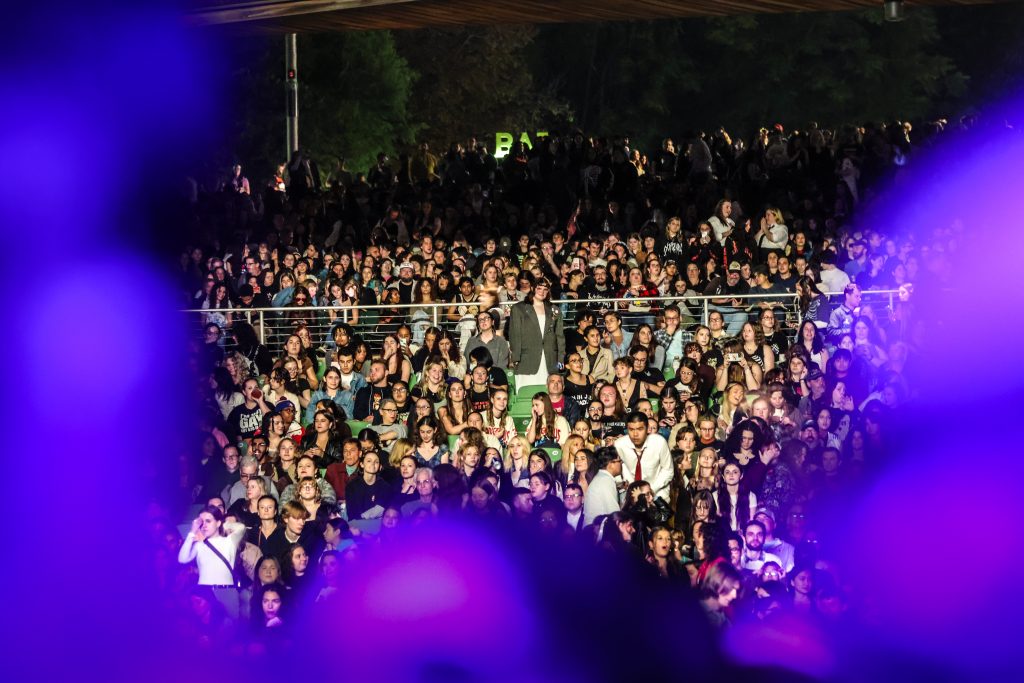
On Friday, May 10, Drexel’s Dragon Concert Series, Flux and Women in Music collaborated to plan a behind-the-scenes tour of The Mann Center for their members. The Mann Center is a performing arts center in Fairmount Park that acts as a concert venue, a multi-purpose events space, an education center and much more. The tour was led by Emily Stock, the manager of venue production operations; Ashley Vanett, the director of private events and facility rentals — and Drexel Music Industry Program alumna; Ian Brown, the front of house manager, Maggie Long, the private events coordinator and Dazia Williams, a production assistant. Throughout the tour, The Mann’s staff revealed to students the meticulous planning and unwavering dedication that is required to successfully put on concerts as well as host other events in a multi-purpose entertainment space.
The tour began at The Skyline Stage, which is The Mann’s festival-style setup with a capacity of about 7,000 audience members. What was once a temporary structure that had to be built up and torn down every season is now a permanent stage, which has greatly simplified the process of setting up for shows. There is now concrete poured behind the stage so that trucks and forklifts do not sink or get stuck in the mud while loading equipment into the area if it has rained, which was a poignant hypothetical as it was raining heavily on the day of the tour. Vanett noted that small details such as preventing vehicles from getting stuck are in line with the staff’s goal of “always trying to make this a good experience for the back of house and front of house.” In the performing arts business, keeping those who put on the show happy is just as important as entertaining customers to ensure smooth sailing productions and a healthy work environment.
The next space on The Mann’s campus that students visited was Crescendo. This is a covered space that is used primarily for hosting dinners before select shows — particularly, before performances from the Philadelphia Orchestra. In Crescendo, the students were taught about the intricacies of organizing dining at an event space. The Mann has a set menu posted on the website for pre-concert dinners, however, they work with a variety of caterers for private events that may be held in Crescendo’s space. They have previously hosted events such as yoga classes, galas, weddings, Philadelphia Magazine events and even Bar and Bat Mitzvahs. While the selection is limited to pre-approved caterers, Vanett explained that this is to ensure both safety and guest satisfaction. The Mann has screened catering companies to ensure they provide a variety of options while maintaining quality, cleanliness, organization and reliability. Such details are indicative of the types of decisions that go on behind the scenes that a concert attendee may not consider, representing the full breadth of working at a performing arts space. Other spaces on The Mann’s campus include Acclaim, a pre-furnished space typically used for pre- or post-concert receptions; the Cadillac terrace, which is used to bring together major donors and guests during events; and Woodlands by TD which is a multi-purpose open-air setting for outdoor events.
But beyond the technical aspects, The Mann is dedicated to providing top-notch customer service. Brown delved into services provided by The Mann to ensure guest satisfaction and safety before concerts even begin. For example, he noted that free parking is offered to reduce pre-show congestion and improve the overall experience for patrons by limiting wait times. To further enhance guest satisfaction, outside lawn chairs are no longer permitted, eliminating delays caused by metal detectors and ensuring a smoother entry process. Instead, the Mann is planning to offer rental chairs to provide a more comfortable viewing experience for attendees. Accessibility is also a key focus, with accommodations made for patrons with disabilities or mobility issues. For sold-out shows, lawn screens and speakers are added to enhance the viewing and listening experience for those seated farther from the stage. Brown noted that each decision made by the staff is “always going back to customer service and guest satisfaction and safety” because ultimately, running a performing arts venue is a customer service job.
The main stop on the tour was the Presser Foundation Stage,the venue’s main stage. Given that it is the most frequently utilized space and that it has been permanent since its building, putting on productions or hosting events on the Foundation Stage is a more streamlined process than the other more multi-purpose spaces. There is a set number of stagehands and teamsters that work at The Mann and know all of the ins and outs of The Foundation stage, which helps to minimize any issues with load-in, production and load-out. It is important to have such experts understand the space they are working in to ensure that artists whose shows cannot work at The Mann would not be surprised upon arrival.
In addition to its commitment to customer service, The Mann is deeply rooted in its community. Programs like the All City Orchestra Summer Academy and the Motion and Music Academy provide invaluable opportunities for local youth to explore their passion for the arts and gain hands-on experience in the industry. As a nonprofit, The Mann needs to engage in such community-building to gain the support of locals who want to preserve the venue and all of its efforts. The behind-the-scenes tour of The Mann Center showcased not only the meticulous planning and dedication required for successful concerts and events but also emphasized the venue’s commitment to top-notch customer service, accessibility and community engagement, reflecting the multifaceted nature of running a performing arts space.


